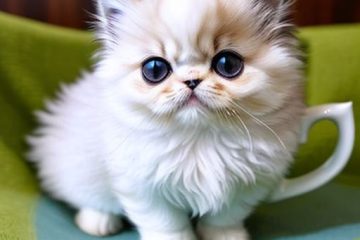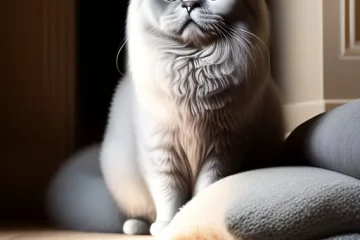Persian cats are one of the most beloved and admired breeds worldwide.
Their luxurious long fur, distinctive flat face, and gentle demeanor make them instantly recognizable and utterly charming.
Beyond their physical beauty, Persian cats are also known for their unique personalities that set them apart from other feline companions.
In this article, we will delve into the fascinating world of the personality of Persian cats and discover what makes them such wonderful companions.

History of Persian Cats
The history of Persian cats dates back to ancient times. Their origins can be traced to the region now known as Iran, formerly known as Persia, hence the name “Persian” cats.
These majestic felines were highly treasured and revered by royalty and nobility throughout history.
Persian cats gradually spread to other parts of the world through trade and exploration, eventually gaining popularity globally.
Physical Characteristics of Persian Cats
Persian cats boast an array of distinctive physical traits. They have a rounded, brachycephalic head with a short nose and large, expressive eyes.
Their luxurious coat comes in a wide variety of colors and patterns, and their fluffy tails add to their overall elegance.
You May Like: How to Identify a Persian Cat
Personality Traits of Persian Cats
Affectionate and Calm Nature
Persian cats are renowned for their affectionate and calm temperament. They thrive on human companionship and enjoy cuddling and being petted.
Their gentle and placid nature makes them ideal lap cats, providing comfort and companionship to their owners.
Independent Demeanor
Despite their affectionate nature, Persian cats also exhibit a level of independence. They appreciate their alone time and may retreat to a quiet corner to relax and recharge.
This mix of affection and independence makes them well-suited for various living environments.
Playful and Curious Behavior
Contrary to the stereotype of being lazy, Persian cats can be quite playful and curious. They enjoy interactive toys and engaging in games with their human companions.
This playful side adds a delightful element to their otherwise composed demeanor.
You May Also Like: Fun Things To Do With Your Persian Cat
Reserved Around Strangers
Persian cats are generally reserved around strangers. They may take some time to warm up to new people and prefer the company of familiar faces.
Once they establish trust, they become devoted and loving companions.
Grooming Habits and Care
Their long, luxurious fur requires regular grooming to prevent matting and tangles. Grooming sessions can also serve as bonding time between the cat and its owner.
Proper grooming is essential to maintain their majestic appearance and keep their coat healthy.
Adaptability to Living Environment
Persian cats adapt well to different living environments, making them suitable for both apartments and houses.
Their calm and composed demeanor helps them adjust to various household dynamics, including families with children or other pets.
Persian Cats as Companions
Persian cats make excellent companions for individuals and families alike. Their loving and gentle nature creates a strong bond with their owners.
They are known to provide emotional support and comfort during challenging times, making them exceptional therapy animals.
Training and Socialization
Early socialization is crucial for Persian cats to build confidence and ease in various situations.
Gentle training can also help them learn basic commands and appropriate behaviors, ensuring a harmonious living environment.
Common Health Issues in Persian Cats
Persian cats are predisposed to certain health issues due to their unique physical characteristics.
These may include respiratory problems related to their brachycephalic head structure and dental issues due to their shortened face.
Proper Nutrition for Persian Cats
A balanced diet is essential for the well-being of Persian cats. High-quality cat food that addresses their specific needs, such as hairball control, is recommended.
Providing fresh water and portion control are vital aspects of their dietary routine.
Grooming and Maintenance
Regular grooming sessions are a must for Persian cats. Daily brushing helps prevent mats and tangles, keeps their coat clean, and minimizes shedding.
Additionally, routine check-ups with a veterinarian are essential to monitor their health.
The Myth of the “Lazy” Persian Cat
Contrary to common misconceptions, Persian cats are not inherently lazy. While they may enjoy lounging around, they are also playful and enjoy interacting with their human companions.
Engaging them with toys and activities can bring out their active side.
You May Also Like: Tortoiseshell Persian Cats: A Beautiful and Unique Feline Breed
Choosing the Right Persian Cat
When considering adopting a Persian cat, it’s essential to choose a reputable breeder or consider adopting from a shelter.
Evaluating the cat’s personality, health, and compatibility with your lifestyle is vital to ensure a happy and fulfilling relationship.
Conclusion
In short, Persian cats are much more than just a pretty face. Their personalities are a captivating mix of affection, independence, and curiosity.
As loving and devoted companions, they have charmed their way into the hearts of countless cat enthusiasts worldwide.
FAQs
1. Do Persian cats have good personalities?
Persian cats are known for their good personalities. They are generally affectionate, calm, and loving companions, making them highly sought-after pets.
2. How loving are Persian cats?
Persian cats are incredibly loving creatures. They enjoy being close to their owners, cuddling, and receiving affection. Their gentle nature makes them excellent companions for those seeking a loving feline friend.
3. Are Persian cats smart?
Persian cats are intelligent animals, although their intelligence may differ from other breeds. While they may not showcase their smarts through tricks like some other breeds, they possess inherent wisdom and exhibit intelligence in their own unique ways.
4. Are Persian cats calm?
Yes, Persian cats are known for their calm temperament. They have a placid nature and prefer a peaceful environment. Their composed demeanor adds to their charm and makes them ideal pets for those seeking a tranquil companion.
5. Do Persian cats like hugs?
While each Persian cat may have its preferences, many of them enjoy gentle affection, including hugs. However, it’s important to understand your cat’s body language and respect their boundaries. Some Persian cats may prefer softer forms of physical contact.
6. Do Persian cats meow a lot?
Persian cats are generally not known for being excessively vocal. They tend to communicate through softer meows and purring. However, each cat has its unique personality, so there may be variations in vocalization among Persian cats.
7. Why are Persian cats so calm?
The calm nature of Persian cats can be attributed to various factors, including their breeding history and genetic traits. Additionally, their independent and reserved demeanor contributes to their overall calmness. Their serene disposition makes them great companions for those seeking a peaceful and tranquil living environment.
8. Are Persian cats not playful?
Contrary to the stereotype, Persian cats can indeed be playful. While they may have a more relaxed approach to play compared to some other breeds, they still enjoy interactive toys and engaging in gentle playtime with their owners. Each cat may have its preferred play style, so it’s important to find activities that align with their individual preferences.
9. Are Persian cats the friendliest?
Persian cats are known for their friendly and affectionate nature. However, it’s important to remember that each cat is unique, and individual personalities may vary. Some Persian cats may be exceptionally friendly and outgoing, while others may be a bit more reserved. Proper socialization and a loving environment can contribute to fostering a friendly relationship with your Persian cat.
10. Are Persian cats short-tempered?
Persian cats, in general, are not known for being short-tempered. They have a gentle and calm nature, which often translates to patience and tolerance. However, as with any living being, individual cats may have their own temperamental traits, and it’s important to respect their boundaries and provide a nurturing environment.
11. Are Persians good indoor cats?
Yes, Persian cats make excellent indoor cats. Their calm and reserved nature makes them well-suited for living in indoor environments. They thrive in a secure and comfortable home, where they can enjoy their peaceful surroundings.
12. Are Persian cats aggressive?
Persian cats are not typically aggressive by nature. They are known for their gentle and docile temperament. However, as with any animal, there can be exceptions and individual variations. Proper socialization, positive reinforcement, and a loving environment are key to promoting a peaceful and non-aggressive demeanor in Persian cats.
13. Do Persian cats like to stay indoors?
Persian cats generally prefer staying indoors. They feel more secure and comfortable in the safety of their home environment. Their calm and composed nature aligns well with the serene atmosphere of indoor living. However, it’s essential to provide them with environmental enrichment and mental stimulation to keep them happy and content.


